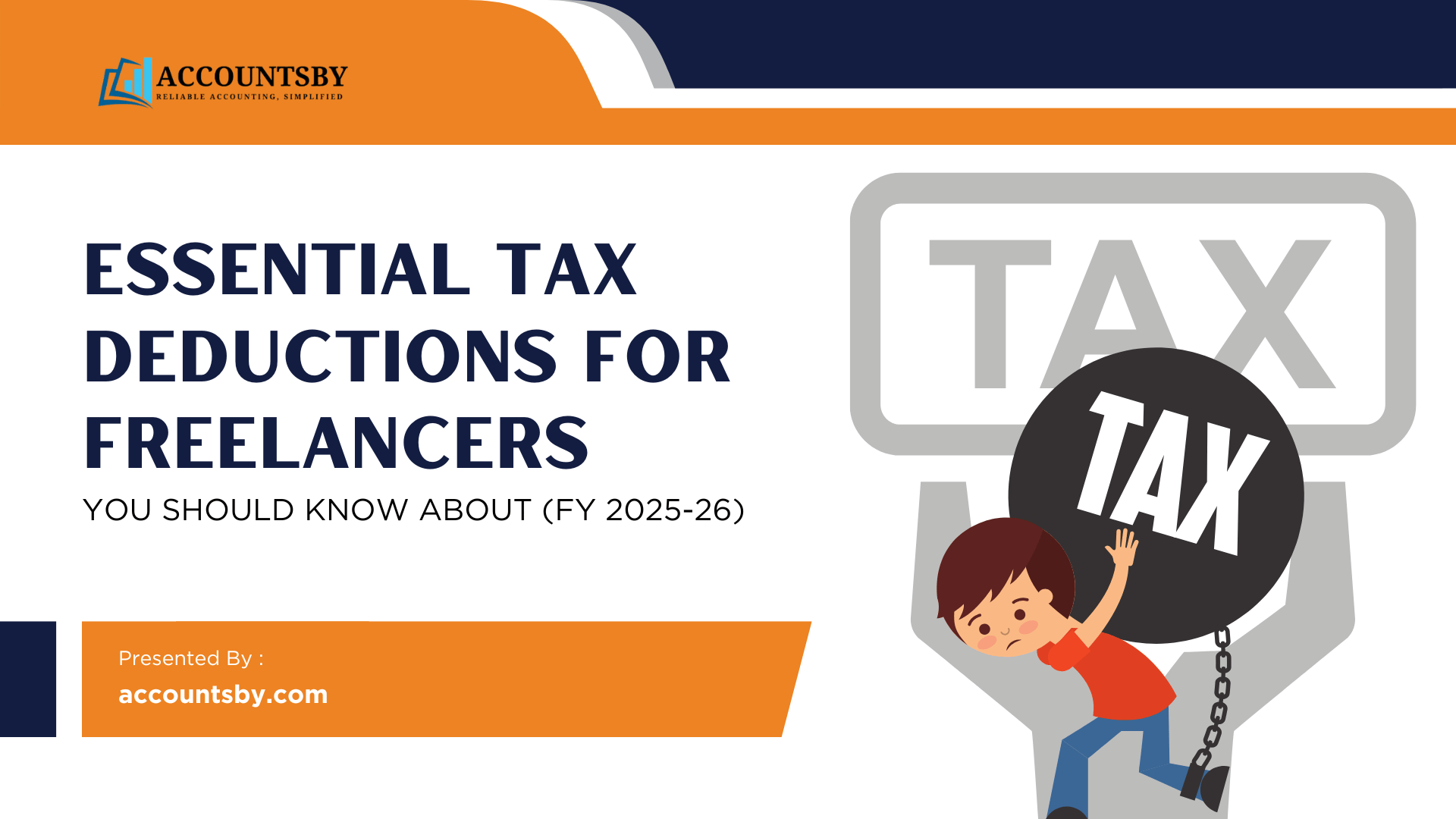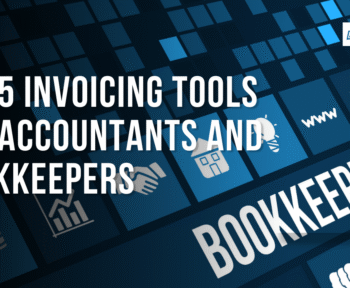Being a freelancer in India is fantastic – you’re your own boss! But with that freedom comes the important job of handling your own money, especially your own taxes. Unlike people with regular jobs, you don’t have an employer to sort out your tax deductions. This means understanding tax deductions for freelancers is super important to pay less self-employed taxes.
For the financial year starting April 2025 and ending March 2026, knowing these tax tips 2025 can help you save money legally. This simple guide will show you the various tax deductions for freelancers that can make a big difference to how much tax you pay. Keeping simple records, or doing basic freelance accounting, will help you use these tips effectively.
Your Tax Choices as a Freelancer and Key Tax Deductions for Freelancers
As a self-employed person (like a professional or someone running a small business), your income is seen as “Profits and Gains from Business or Profession.” This means you can reduce your total earnings by taking away your valid business costs. The government wants to make tax filing easier. From FY 2025-26, the “New Tax Regime” is the standard option. It has lower tax rates. If you want to use the “Old Tax Regime” and claim more deductions (like for investments), you’ll have to choose it specially. Also, if you earn up to ₹12 Lakhs a year under the New Tax Regime, you might not have to pay any tax at all due to a special rebate!
Let’s look at the two main options for paying your self-employed taxes:
| What’s Different? | Old Tax Regime (You choose this) | New Tax Regime (This is the automatic choice) |
| Savings | Lets you claim many tax deductions for freelancers (like for investments, health insurance, home loan interest). | Has lower tax rates but allows very few deductions. |
| Tax Rates | Higher tax rates. | Simpler, lower tax rates. If you earn up to ₹12 Lakhs, you might pay zero tax because of a special tax rebate. |
| Who is it for? | Freelancers with big investments (like PPF, ELSS), home loans, or health insurance premiums. | Freelancers who don’t have many expenses or investments to claim, or who like simpler tax rules. |
Export to Sheets
- Tax Tip 2025: Think about your spending and investments. If you have a lot of things you can deduct, the Old Regime might save you more money. If not, the New Regime could be simpler and still save you money with its lower rates. It’s always smart to talk to a tax advisor (CA) to figure out what’s best for you and your tax deductions for freelancers.
Smart Ways to Reduce Your Tax: Business Expenses (Direct Deductions)
These are costs you pay directly to earn your freelance income. Keeping good records (like bills and receipts) is very important for your freelance accounting. These legitimate expenses directly lower the income you pay tax on. These are some of the most common tax deductions for freelancers.
1. Office and Work Space Costs
Even if you work from a separate office or from home, many costs can be taken off your income.
- Rent (Office/Home Office): If you rent an office, the full rent you pay can be deducted. If you work from home, you can deduct a part of your house rent, electricity, internet bills, and even maintenance costs, based on how much of your home space you use only for work. The space must be used regularly and only for your business.
- Office Supplies: Pens, paper, printer ink, and other small items you buy for your work.
- Internet and Phone Bills: The part of your internet and phone bill that you use for work-related calls and online activities. Keep track of this usage.
2. Learning and Growing Your Business
These costs help you improve your skills and get more clients, directly affecting your self-employed taxes. These also count as important tax deductions for freelancers.
- Fees to Experts: Money you pay to a tax expert (CA) to file your taxes, or to a lawyer, or other professionals who help your freelance business.
- Software & Online Tools: Costs for software licenses (like for design, editing, project management, or even simple freelance accounting software), website hosting, and any online tools or apps you use for your work.
- Courses & Training: Money spent on workshops, online courses, or certifications that help you get better at your freelance skills (e.g., a writer taking a course on advanced SEO, a graphic designer learning new software).
- Books & Magazines: Professional books or subscriptions that help you learn and grow in your field.
- Marketing & Advertising: Money spent to promote your services, like making a website, running online ads, printing business cards, or creating brochures.
3. Travel Costs
If your work needs you to travel, these can be good tax deductions for freelancers.
- Local Travel: Money spent on auto, cab, bus, or fuel for your own vehicle when you go to meet clients, attend business events, or buy supplies for your work.
- Business Trips: Costs of flights, train tickets, hotels, and food when you travel outside your city or even country for client meetings, conferences, or business development. Remember to keep all tickets and hotel bills!
- Vehicle Expenses: If you use your personal vehicle for work, a part of its maintenance, fuel, insurance, and even interest on a loan taken for the vehicle (if used for business) can be deducted.
4. Depreciation (Cost of Big Purchases)
When you buy big things for your freelance business that you’ll use for more than a year (like a laptop or camera), you can’t deduct the full cost at once. Instead, you deduct a small part of its cost each year. This is called depreciation, and it’s a valuable one of the tax deductions for freelancers.
- Examples: Laptops, desktop computers, printers, scanners, professional cameras, specific office furniture, or expensive software.
Simple Rule: You can only deduct the part of the asset that you use for your business. For instance, if you use your laptop 70% for work and 30% for personal use, you can only claim 70% of its depreciation.
Simple Tax Scheme (Section 44ADA): For Easier Taxes!
For many freelancers, Section 44ADA of the Income Tax Act offers a super easy way to handle self-employed taxes. This scheme means you don’t have to keep very detailed records of all your expenses.
- Who can use it? Professionals like doctors, lawyers, architects, engineers, accountants, technical consultants, interior decorators, and certain artists, if their total earnings for the year are not too high.
- Money Limit: Your total earnings from your profession should be less than ₹75 Lakhs for FY 2025-26, if most of your payments (95% or more) come through digital methods (like bank transfers, UPI). If you get a lot of cash, the limit is ₹50 Lakhs.
- How it works: You simply declare that 50% of your total earnings is your taxable income. The other 50% is considered to cover all your expenses.
- Good points:
- No need to keep detailed records of every small expense.
- No need for a special tax audit if you declare at least 50% as your income.
- Tax filing becomes much simpler.
Important Note: If your actual expenses are more than 50% of your total earnings, then this scheme might not save you the most money. In that case, it’s better to keep detailed records and file your tax return under the regular rules to claim all your actual expenses. This is a crucial tax tip 2025 for freelancers who have high work-related costs.
Other Common Deductions (Mostly for Old Tax Regime)
If you choose the Old Tax Regime, these tax deductions for freelancers can greatly reduce your self-employed taxes.
- Section 80C (Save up to ₹1.5 Lakhs): This is very popular! You can save tax by investing in:
- Life Insurance premiums
- Public Provident Fund (PPF)
- Equity Linked Savings Schemes (ELSS – a type of mutual fund)
- National Savings Certificates (NSC)
- Repaying the main amount of your home loan
- Children’s school fees (for up to two children)
- Section 80D (Health Insurance): You can deduct money paid for health insurance premiums:
- Up to ₹25,000 for yourself, your spouse, and dependent children (or ₹50,000 if you are a senior citizen).
- An extra ₹25,000 (or ₹50,000 for senior citizens) for your parents’ health insurance.
- Section 24(b) (Home Loan Interest): The interest you pay on your home loan can be deducted. Up to ₹2 Lakhs for a house you live in. For a rented-out property, you can claim all the interest.
- Section 80G (Donations): Money you donate to approved charities can also get you a tax deduction (50% or 100%, depending on the charity).
Key Tips for Your Freelance Accounting and Tax Filing
- Keep Good Records: Save all your invoices, receipts, bank statements, and payment proofs. Good freelance accounting is your best friend if the tax department ever asks questions.
- Separate Bank Accounts: Always have a separate bank account for your freelance income and expenses. This makes tracking much easier and avoids mixing your personal and business money.
- Pay Advance Tax: If you think your tax bill for the year (after any TDS is cut) will be more than ₹10,000, you need to pay taxes in installments throughout the year. These are called advance tax payments, usually due by June 15, September 15, December 15, and March 15.
- Tax Tip 2025: If you use the simple Presumptive Taxation Scheme (Section 44ADA), you can pay all your advance tax by March 15 of the financial year.
- Choose the Right Form:
- ITR-3: If you keep detailed records of all your income and expenses.
- ITR-4 (Sugam): If you use the simple Presumptive Taxation Scheme (Section 44ADA).
- Get Help from a Pro: While this guide covers many aspects, a qualified tax expert (Chartered Accountant or CA) can provide personalized advice, ensure everything is correct, and help you find all possible tax deductions for freelancers.
Also Read: Income Tax Login: How to Access the Income Tax Portal, E-filing, and Return Filing
Final Word: Empower Your Freelance Journey with Tax Deductions for Freelancers
Learning about and using tax deductions for freelancers is a smart move for anyone working independently. It’s not about avoiding taxes, but about using the legal rules to optimize your self-employed taxes and keep more of your hard-earned money. By implementing smart freelance accounting practices and staying informed on tax tips 2025, you empower yourself to manage your finances effectively, avoid unnecessary penalties, and ensure a robust financial future for your freelance career. Don’t leave money on the table – educate yourself and claim all the tax deductions for freelancers that are rightfully yours!
Where to Find More Info (References):
- Income Tax Department, Government of India: This is the official government website for all tax information. www.incometax.gov.in
- ClearTax / Bajaj Finserv / Groww / Paytm: Popular websites that explain Indian tax laws in simpler terms and offer tax-related tools.
- Institute of Chartered Accountants of India (ICAI): The official body for CAs in India, providing detailed accounting and tax standards. www.icai.org




